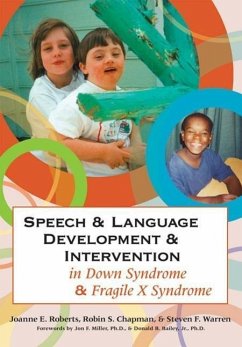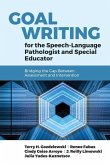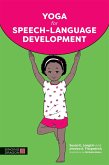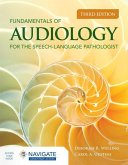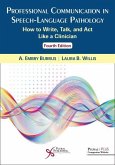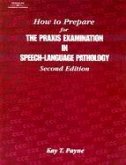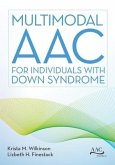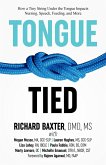Speech & Language Development & Intervention in Down Syndrome & Fragile X Syndrome
Herausgeber: Roberts, Joanne; Fey, Marc E; Warren, Steven F; Chapman, Robin
Speech & Language Development & Intervention in Down Syndrome & Fragile X Syndrome
Herausgeber: Roberts, Joanne; Fey, Marc E; Warren, Steven F; Chapman, Robin
- Broschiertes Buch
- Merkliste
- Auf die Merkliste
- Bewerten Bewerten
- Teilen
- Produkt teilen
- Produkterinnerung
- Produkterinnerung
Spotlighting two highly prevalent genetically-caused developmental disabilities--Down syndrome and fragile X syndrome--this text clarifies the distinct speech and language issues associated with each disorder and helps readers conduct individualized assessment and intervention. An essential upper-level textbook and an invaluable professional reference, this book gives readers the up-to-date research and clinical insight they need to - understand the behaviors, characteristics, and genetics associated with both disabilities - see how speech and language develop across the life span - tailor…mehr
Andere Kunden interessierten sich auch für
![Goal Writing for the Speech-Language Pathologist and Special Educator: Bridging the Gap Between Assessment and Intervention Goal Writing for the Speech-Language Pathologist and Special Educator: Bridging the Gap Between Assessment and Intervention]() Terry Hausner GozdziewskiGoal Writing for the Speech-Language Pathologist and Special Educator: Bridging the Gap Between Assessment and Intervention68,99 €
Terry Hausner GozdziewskiGoal Writing for the Speech-Language Pathologist and Special Educator: Bridging the Gap Between Assessment and Intervention68,99 €![Yoga for Speech-Language Development Yoga for Speech-Language Development]() Susan E LongtinYoga for Speech-Language Development29,99 €
Susan E LongtinYoga for Speech-Language Development29,99 €![Fundamentals of Audiology for the Speech-Language Pathologist Fundamentals of Audiology for the Speech-Language Pathologist]() Deborah R WellingFundamentals of Audiology for the Speech-Language Pathologist137,99 €
Deborah R WellingFundamentals of Audiology for the Speech-Language Pathologist137,99 €![Professional Communication in Speech-Language Pathology: How to Write, Talk, and ACT Like a Clinician Professional Communication in Speech-Language Pathology: How to Write, Talk, and ACT Like a Clinician]() BurrusProfessional Communication in Speech-Language Pathology: How to Write, Talk, and ACT Like a Clinician106,99 €
BurrusProfessional Communication in Speech-Language Pathology: How to Write, Talk, and ACT Like a Clinician106,99 €![How to Prepare for the Praxis Examination in Speech-Language Pathology How to Prepare for the Praxis Examination in Speech-Language Pathology]() Kay T. PayneHow to Prepare for the Praxis Examination in Speech-Language Pathology95,99 €
Kay T. PayneHow to Prepare for the Praxis Examination in Speech-Language Pathology95,99 €![Multimodal Aac for Individuals with Down Syndrome Multimodal Aac for Individuals with Down Syndrome]() Multimodal Aac for Individuals with Down Syndrome47,99 €
Multimodal Aac for Individuals with Down Syndrome47,99 €![Tongue-Tied Tongue-Tied]() Dmd BaxterTongue-Tied13,99 €
Dmd BaxterTongue-Tied13,99 €-
-
-
Spotlighting two highly prevalent genetically-caused developmental disabilities--Down syndrome and fragile X syndrome--this text clarifies the distinct speech and language issues associated with each disorder and helps readers conduct individualized assessment and intervention. An essential upper-level textbook and an invaluable professional reference, this book gives readers the up-to-date research and clinical insight they need to - understand the behaviors, characteristics, and genetics associated with both disabilities - see how speech and language develop across the life span - tailor assessment and intervention to individual needs and abilities - apply the techniques where appropriate with individuals who have other disabilities, such as autism - encourage family involvement
Produktdetails
- Produktdetails
- Verlag: Brookes Publishing Company
- Seitenzahl: 288
- Erscheinungstermin: 6. November 2007
- Englisch
- Abmessung: 251mm x 177mm x 20mm
- Gewicht: 574g
- ISBN-13: 9781557668745
- ISBN-10: 1557668744
- Artikelnr.: 23336877
- Herstellerkennzeichnung
- Libri GmbH
- Europaallee 1
- 36244 Bad Hersfeld
- gpsr@libri.de
- Verlag: Brookes Publishing Company
- Seitenzahl: 288
- Erscheinungstermin: 6. November 2007
- Englisch
- Abmessung: 251mm x 177mm x 20mm
- Gewicht: 574g
- ISBN-13: 9781557668745
- ISBN-10: 1557668744
- Artikelnr.: 23336877
- Herstellerkennzeichnung
- Libri GmbH
- Europaallee 1
- 36244 Bad Hersfeld
- gpsr@libri.de
Ronald B. Gillam, Ph.D., Raymond L. and Eloise H. Lillywhite Professor, Department of Communicative Disorders and Deaf Education, Utah State University, 1000 Old Main Hill, Logan, Utah 84322 Dr. Gillam's research, which has been funded by the National Institute on Deafness and Other Communication Disorders and the U.S. Department of Education, primarily concerns information processing, language assessment, and language intervention with school-age children with language impairments. Dr. Gillam has been the associate editor of the American Journal of Speech-Language Pathology (1996-1999) and the Journal of Speech, Language, and Hearing Research (2001-2004; 2010- 2013). In addition to publishing more than 130 articles and book chapters, Ron has published three tests and two other books--Memory and Language Impairment in Children and Adults (Aspen, 1988) and Communication Sciences and Disorders: From Science to Clinical Practice (co-edited with Thomas Marquardt & Fredrick Martin; Singular, 2000; Jones & Bartlett, 2010, 2015). Dr. Gillam's teaching and research awards include ASHA Fellow, the Hayden Williams Fellowship at Curtin University in Western Australia, and the Robins Award for the outstanding researcher at Utah State University. Alan G. Kamhi, Ph.D., is Adjunct Professor in the Department of Communicative Disorders at Northern Illinois University. Since the mid-1970s, he has conducted research on many aspects of developmental speech, language, and reading disorders. He has written several books with Hugh Catts on the connections between language and reading disabilities as well as two books with Karen E. Pollock and Joyce Harris on communication development and disorders in African American speakers. His current research focuses on how to use research and reason to make clinical decisions in the treatment of children with speech, language, and literacy problems. He began a 3-year term as the Language Editor for the Journal of Speech, Language, and Hearing Research in January 2004 and served as Editor of Language, Speech, and Hearing Services in Schools from 1986 to 1992. James Law, Ph.D., Professor of Speech and Language Science, Institute of Health and Society, School of Education, Communication and Language Sciences, Newcastle University, Victoria Road, Newcastle-upon-Tyne, NEI 7RU, United Kingdom James Law graduated with a degree in linguistics before qualifying as a speech and language therapist. His principal research interests are child language and language learning diffi culties, evidence-based practice and intervention, and mapping longitudinal outcomes for children with language diffi culties. He has had a wide range of research funding, most recently as a principal investigator on the £1.5m Better Communication Research Programme in the United Kingdom and the Centre for Research Excellence in Child Language in Victoria, Australia. Rose A. Sevcik, Ph.D., is Distinguished Professor of Psychology and Chair of the Developmental Psychology Doctoral Program. She is the founding co-director of the university's Area of Focus: Research on Challenges to Acquiring Language and Literacy and a member of the Center for Research on Atypical Development and Learning (CRADL). She has made significant contributions to the field of developmental and learning disabilities and language and reading intervention research through more than 100 peer-reviewed publications, chapters, and books and numerous presentations at national and international conferences. She has been an investigator on 12 federally funded projects (NIH, IES) with a long history of working with schools. Dr. Sevcik is a Fellow of the American Speech-Language-Hearing Association and the International Society of Augmentative and Alternative Communication. She also is a Fellow of the American Association on Intellectual and Developmental Disabilities and past President of its Communication Disorders Division. A member of the National Joint Committee on the Communication Needs of Persons with Severe Disabilities, she is also on the Board of Directors for the United States Society for Augmentative and Alternative Communication. Donna J. Thal, Ph.D., holds a master of science degree in speech pathology and audiology from Brooklyn College and a doctorate in speech and hearing sciences from the Graduate School and University Center of the City University of New York (CUNY). She has been a postdoctoral fellow at the Center for Research in Language at UCSD, an assistant professor at Hofstra University, and an assistant professor at Queens College of CUNY. Dr. Thal is a developmental psycholinguist and a certified and licensed speech-language pathologist who has conducted research in a number of areas, including normal and disordered development of language and cognition, children with focal brain injury, and children with delayed onset of language. She has also carried out studies of language development in Spanish-speaking infants and toddlers. Her most recent work focuses on early identification of risk for clinically significant language impairment and is funded by a grant from the National Institute of Deafness and Other Communicative Disorders (NIDCD), within the National Institutes of Health. Dr. Thal is an editorial consultant for language for the Journal of Speech, Language, and Hearing Research and the American Journal of Speech-Language Pathology. She was the California State nominee for the American Speech-Language-Hearing Foundation Outstanding Clinical Achievement Award in 1996, received the Monty Distinguished Faculty Award from SDSU 1998 and the Albert W. Johnson Research Lecturer Award from SDSU in 1999, and was the Wang Family Excellence Award nominee from SDSU in 2000. She served a 4-year term on the Communicative Disorders Review Committee for the NIDCD from 1998 to 2002. Dr. Thal is a co-author of the MacArthur Communicative Development Inventories. Dr. van Kleeck's research focuses on language and emerging literacy skills in children who are language impaired as well as the broader group of children who are at risk academically. Some specific areas of interests include (a) parentsâ (TM) language socialization processes in the home that provide their young children with foundations for later literacy and academic success, and (b) issues related to language assessment in the preschool population. Her most recent work focuses on what she refers to as the academic talk register in preschoolers, and itâ (TM)s importance to later academic achievement. Dr. van Kleeckâ (TM)s previous publications include several edited books, nearly 50 peer-reviewed journal articles, and 25 book chapters. She has given several hundred invited and peer-reviewed presentations nationally and internationally. Susan Ellis Weismer, Ph.D., Oros-Bascom Professor, Department of Communication Sciences and Disorders, Associate Dean for Research, College of Letters and Science, University of Wisconsin-Madison, 1500 Highland Avenue, Madison, Wisconsin 53705 Susan Ellis Weismer is Oros-Bascom Professor of Communication Sciences and Disorders and Principal Investigator at the Waisman Center. Her program of research focuses on understanding the developmental course and mechanisms underlying language acquisition in late talkers, specific language impairment, and autism spectrum disorders. Her research has been funded by the National Institutes of Health for more than 25 years. Donald B. Bailey, Jr., Ph.D., is Distinguished Fellow at RTI International. He is internationally known as an expert on young children with disabilities. For 27 years, he was on the faculty of the University of North Carolina at Chapel Hill where he was a W.R. Kenan, Jr. Distinguished Professor and, for 14 years, director of the Frank Porter Graham Child Development Institute. Dr. Bailey has addressed a variety of issues in his research and publications related to early intervention of children with disabilities and their families, with a particular focus on family support, inclusion, early identification, and fragile X syndrome. He has an extensive record of publications, with more than 200 peer-reviewed articles, chapters, and books on a wide variety of topics related to early education, early intervention, disability, and family support. Jon F. Miller, Ph.D., is Director of the Language Analysis Laboratory at The Waisman Center at the University of Wisconsin-Madison. He has published extensively in the areas of child language development and disorders, language assessment, and language intervention. In addition, he has been investigating early language development in children with Down syndrome in a longitudinal research project funded by the National Institutes of Health since 1988. Leonard Abbeduto, Ph.D., is the Director of the MIND Institute, the Tsakopoulos-Vismara Endowed Chair, and Professor of Psychiatry and Behavioral Sciences at the University of California, Davis. Dr. Abbedutoâ (TM)s research is focused broadly on the development of language across the lifespan in individuals with neurodevelopmental disorders and the family context for language development. Dr. Abbeduto has received numerous awards, including the Emil A. Steiger Award for Distinguished Teaching from the University of Wisconsin-Madison, the Faculty Stewardship Award from the University of California, Davis, the Enid and William Rosen Research Award from the National Fragile X Foundation, and Edgard Doll Award for Distinguished Research Contributions from Division 33 of the American Psychological Association. He earned his Ph.D. in psychology from the University of Illinois at Chicago in 1982. Nancy C. Brady, Ph.D., Associate Professor, Department of Speech Language Hearing Sciences and Disorders, University of Kansas, 1000 Sunnyside Avenue, Lawrence, Kansas 66045 Dr. Nancy Brady conducts research on early language and communication development in children and adults with severe disabilities, including individuals with autism, fragile x syndrome and deaf-blindness. Her research focuses on stages of prelinguistic development, assessing communication, teaching beginning AAC, and pragmatic aspects of early communication. Shelley L. Bredin-Oja, Ph.D., Associate Researcher, Institute for Life Span Studies, University of Kansas, 1000 Sunnyside Avenue, Room 1052, Lawrence, Kansas 66045 Shelley L. Bredin-Oja is an associate researcher in the Bureau of Child Research at the University of Kansas. Her clinical expertise is serving families and toddlers/preschoolers with communication delays. Her research interests include the efficacy and effectiveness of language interventions and grammar development in young children. Raymond D. Kent, Ph.D.is Professor Emeritus of the Department of Communication Sciences and Disorders, University of Wisconsin-Madison. Dr. Kent's primary research interests are (1) speech intelligibility in various clinical populations, especially motor speech disorders in children and adults, (2) typical and atypical development of speech in children, and (3) the development and refinement of methods for the study of speech and its disorders. Most recently, he collaborated on a NIH-supported project that uses MR and CT imaging along with acoustic analyses to study the anatomic development of the vocal tract in relation to its acoustic properties. Dr. Kent has published several specialty books and is currently working on a dictionary of communication sciences and disorders. Dr. Carol Stoel-Gammon is Professor Emerita in the Department of Speech and Hearing Sciences at the University of Washington, Seattle. She received her doctoral degree in Linguistics from Stanford University, and has taught, mentored and carried out research in the area of phonological development and disorders for many years. Her book Normal and Disordered Phonology in Children, co-authored with Carla Dunn was published in 1985. Her research interests focus on prelinguistic vocal development and early phonological development in children who are typically developing, and speech development of children with autism, cleft palate, Down syndrome, Fragile X, childhood apraxia of speech, children who are deaf or hard-of-hearing, and late talkers. Dr. Stoel-Gammon as served as Associate Editor of the Journal of Speech and Hearing Disorders, the Journal of Speech and Hearing Research, the American Journal of Speech-Language Pathology, and the Journal of Child Language. Steven F. Warren, Ph.D., Professor, Speech-Language-Hearing Sciences and Disorders, Dole Human Development Center, University of Kansas, 1000 Sunnyside Avenue, #3045, Lawrence, Kansas 66045 Dr. Steven Warren's research has focused on communication and language development and intervention. Working with various colleagues, Dr. Warren has contributed to the creation of pre-linguistic and milieu intervention approaches. Much of his research has focused on the effect of these intervention approaches and on the role of parenting on moderating the impact of developmental disorders, such as Down syndrome and fragile X Syndrome. Marc E. Fey, Ph.D., CCC-SLP, was emeritus professor for the Hearing and Speech Department at the University of Kansas Medical Center. He published numerous articles, chapters, and software programs on children's speech and language development and disorders and wrote and edited three books on child-language intervention. He was editor of the American Journal of Speech-Language Pathology from 1996 to 1998 and Chair of the American Speech-Language Hearing Association's (ASHA) publications board from 2003 to 2005. He received the Kawana Award for Lifetime Achievement in Publications and the Honors of the Association from ASHA. In Memory of Marc E. Fey The field of communication sciences lost a remarkable leader when Marc Fey passed away on September 12, 2023. At Brookes, we will remember him as the dedicated Co-Series Editor of the Communication and Language Intervention (CLI) book series, which he helped direct and expand for many years. Marc was not only a series editor but also a volume editor/author. One of those titles, Treatment of Language Disorders in Children, now in its second edition and slated for a third, has become a classic text for speech-language pathologists, for its balanced examination of interventions for emerging communication and language as well as more advanced language and literacy. A strong supporter of evidence-based practice, Marc brought his passion for research and commitment to well-designed intervention studies to the selection process for the CLI series. Those books benefited from his keen editorial and writing skills. Our staff who had the pleasure of working with him will remember many enjoyable moments at CLI Board meetings and his collaborative, encouraging leadership. His legacy will live on in the volumes he helped to envision and create for the field, and the difference he made in the lives of so many children with speech and language disorders.

